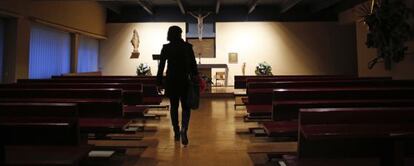Public university, Catholic prayer room?
Debate is hotting up between college leaders and Church officials in Madrid as they discuss the terms of an expiring agreement

Both signs are still up: study room, reads the bigger one; multidenominational prayer room, reads the smaller, newer one. Located in the student housing area of Alcalá de Henares University (UAH), the site has only been a religious space for two weeks.
The change comes in the middle of a renewed debate over whether public universities should have Catholic chapels at all. Four major centers of higher education still do: the Complutense, the Politécnica, Autónoma and the Rey Juan Carlos universities, all located in the Madrid region.
This week, the rectors of Complutense University in Madrid met with Catholic archbishops to discuss the terms of the 1993 agreement that protects eight chapels located on campus. The 10-year agreement ends this year, and the university has expressed a desire to either eliminate the chapels, or turn them into prayer rooms open to all faiths.
However, university leaders have been dragging their feet on the issue, partly due to protests from the Catholic community. Both sides are due to meet again in 15 days to take up talks again.
The previous rector of Complutense University, Carlos Berzosa, left the issue on the back burner even though he personally felt that public universities should not have Catholic chapels. New university leader José Carrillo expressed a willingness to discuss the issue, but also left it for a later date.
Stop harassing Catholics with these intolerant decisions"
It is now nearly a year since the Complutense's geography and history department held a joint meeting of faculty staff, administrative personnel and students, and agreed to move its chapel to a smaller room, alleging space problems. That was after requesting its elimination in 2010, to no avail. If an agreement is reached in two weeks, the transfer would be done next year.
But Madrid's archbishops reject the idea of transferring the geography and history department chapel to a smaller room, calling it "seriously and irreparably detrimental to the Christians at that school" in a letter they sent to the school dean.
Religious leaders also alleged in the same letter that the chapel is "used frequently and serves a growing number" of Catholics. The Dean's office, however, claims that the chapel is practically deserted most of the time.
Regarding the possibility of turning the chapels into "multidenominational prayer rooms," the letter warned that the "desacralization" would have to be performed "by the relevant authority," in this case Antonio María Rouco Varela, archbishop of Madrid.
There is a precedent for changing the location of a chapel on campus. Twenty-five years ago, a Complutense teachers' college called Escuela Universitaria María Jiménez Díaz decided to shut down its chapel because of space concerns. Petitions for and against the move were signed, and the archbishops of Madrid asked for respect for "the spiritual dimension of the university student as part of their training."
But four months after the school faculty made the decision, the crucifix and other religious items were taken to a storeroom that became the new chapel.
Antonio Moreno was the director of the teachers' college, which has since been transformed into the Trade and Tourism department. Walking down the hall of the second floor, he points at the door of the Economic Structure Seminar Room. "The chapel was here," he says. "We changed it and it was not a problem."
But these days, the Catholic community has been vocally protesting the Complutense's plans. The Rectorate has been inundated with thousands of e-mail messages in recent days, courtesy of an anti-abortion group called HazteOír (Make Yourself Heard). Any person can sign a petition that will automatically get sent to the Complutense rector, asking him to "stop harassing Catholics with intolerant decisions, respect the agreement with the archbishops of Madrid and desist from closing the chapels that have served the Complutense community throughout its history."
The truth is, several articles of the 1993 agreement, which EL PAÍS had access to, are already not being observed. For instance, there were plans to open four more chapels in the chemistry, physics, medicine and veterinary studies departments, but only the first did so. Under the original deal, the university was also supposed to pay the chaplain's wages, although in the end they are paid by the Church, which also handles the costs of "equipment, material and activities" within the chapels even though the university was supposed to fund that, too, according to sources.
The website of Madrid's University Pastoral says the chapels at Complutense University hold mass every day, and that chaplains are available for consultation every day in nearly all cases.
Meanwhile, the HazteOír website recently showed that over 32,000 signatures had so far been collected against the closure of the Complutense chapels. Anyone who fills out the form and sends it to the rector receives the following message afterwards: "First they'll close the chapels and then, what will they do? Throw Christians out of the lecture rooms? Prevent them from applying for a teaching or administrative position? Mark them with a cross, like the Jews?"
Tu suscripción se está usando en otro dispositivo
¿Quieres añadir otro usuario a tu suscripción?
Si continúas leyendo en este dispositivo, no se podrá leer en el otro.
FlechaTu suscripción se está usando en otro dispositivo y solo puedes acceder a EL PAÍS desde un dispositivo a la vez.
Si quieres compartir tu cuenta, cambia tu suscripción a la modalidad Premium, así podrás añadir otro usuario. Cada uno accederá con su propia cuenta de email, lo que os permitirá personalizar vuestra experiencia en EL PAÍS.
¿Tienes una suscripción de empresa? Accede aquí para contratar más cuentas.
En el caso de no saber quién está usando tu cuenta, te recomendamos cambiar tu contraseña aquí.
Si decides continuar compartiendo tu cuenta, este mensaje se mostrará en tu dispositivo y en el de la otra persona que está usando tu cuenta de forma indefinida, afectando a tu experiencia de lectura. Puedes consultar aquí los términos y condiciones de la suscripción digital.









































